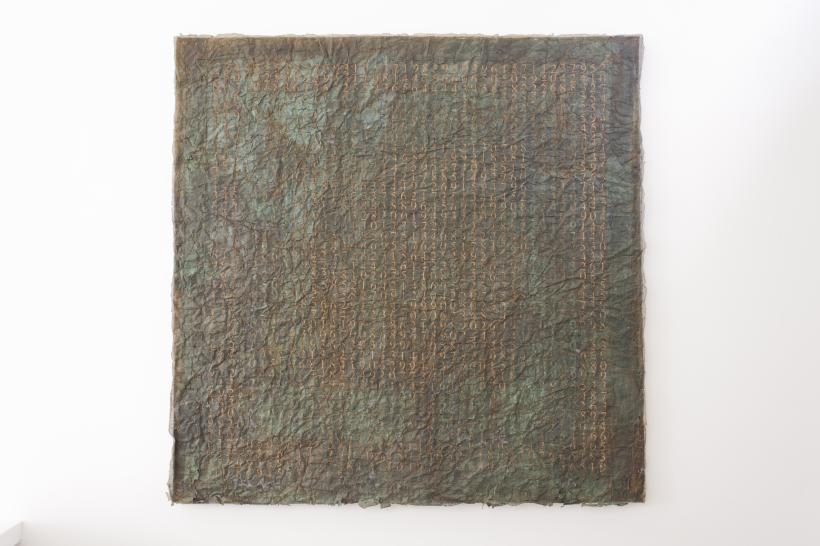David Cheeseman’s solo show ‘Slime Mould Logic’ initiates conversations between separate works that converge and flux like the stuff we encounter in the world. The idea and its image are revised into materiality, becoming works open to interpretation. A homage to Marcel Duchamp’s ‘Comb’ and ‘Three Standard Stoppages’ is formed through this preferencing of processes over substance.
Slime mould can exist as a singular living cell or form a multicellular unit, swarming together to collectively realise essential goals. It is living matter that seemingly “thinks”, expediently navigating routes as would a taxi driver, extrapolating circulatory lanes for the shortest path from A to B. For Cheeseman this logic forms a proposition; stuff and its behaviours can be shaped as magic, even more so when articulated through scientific language. Discoveries formed through mathematics and physics engage us as a type of joy, one underpinned by our suspension of disbelief. Penrose tiling defies translational symmetry to form patterns that dance; science presenter Steve Mould demonstrates how nickel-plated beaded steel chains can self siphon, defy gravity and fly. We have an odd relationship to that which we do not know; it exists without us and when evidenced it’s not as though it did not exist before. These relationships with propositions can also be drawn in response to Duchamp’s readymades in which disparate materials cohere to form astonishing behaviour sets.
Works in the exhibition shift and merge together. In ‘Slime Mould Logic’ a silver birch cut down in the creation of Cheeseman’s studio rests on three blocks of lead glass; it flexes with magnetic putty placed on gold-plated electro magnets as a series of fluctuating orifices; it evidences the shells of dwellings. Objects are scaled-up as with the work ‘Endless In-Between’ – a comb that floats on thousands of Borosilicate glass legs above a sheet of silicone, its fallen teeth immersed into the density of the material. ‘Less Than Said’ uses bog oak to form a graphic sign, a parenthesis with an ellipsis that dances outside it like the three anxious dashes that appear when a text message is forthcoming.
We live in a present where the digital and the organic exist together; to preference one over the other criminally negates potentiality. In Cheeseman’s work ‘A Few Drops More’, an event is presented in which the viewer has been absent; two steel chains have been released from oak and glass containers to fight gravity, the third sits still brimming with the potential for erratic movement. Their fall has been breached by receptacles sited on the floor that each echo the one above. The chains fall in and out of these at will (an echo of Duchamp’s drop of threads, ‘Three Standard Stoppages’) and land where they land forming haphazard piles, accumulating as a mass, their flight against gravity spent. Opposite the physical work the digital manifests; a single channel work on an iPad relays a trinity of mobile phone-sized images of the chains’ flight. This work is open, it presents an action reminiscent of the washing machines posted onto YouTube that laugh their way through their destruction (a brick lodged into their drum and the electricity switched on), yet this work is reframed, rescaled and animated as matter and energy.
The works in Cheeseman’s show are left unencumbered. They are free to roam between conditions of materiality and agency.












